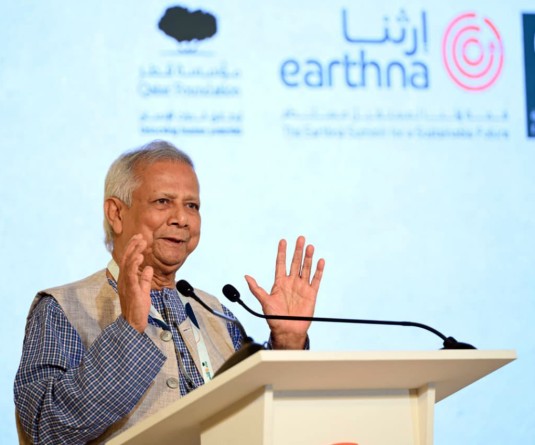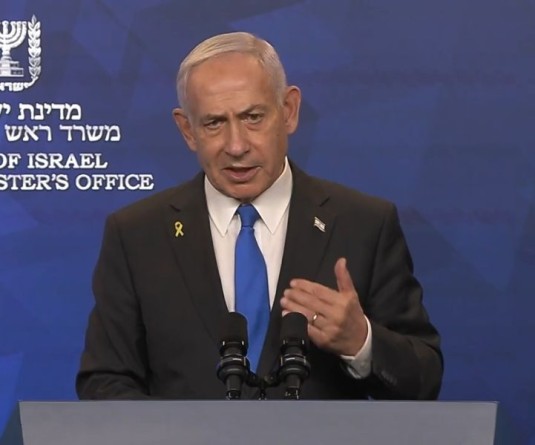
Japanese Emperor Akihito, left, and Empress Michiko, kneel down and smile at people at an evacuation shelter in Asahi City in Chiba Prefecture, about 86 kilometers (54 miles) east of Tokyo on Thursday, April 14 during their first trip to the disaster zone since the March 11 earthquake and tsunami. (AP Photo)
TOKYO, April 14 (AP): Japan's revered emperor made his first trip Thursday to the disaster zone since the March 11 earthquake and tsunami destroyed much of the northeast coast and set off a crisis of radiation leaks at a flooded nuclear plant.
Emperor Akihito and Empress Michiko visited two evacuation shelters Thursday in Asahi city, about 86 kilometers (54 miles) east of Tokyo near the Pacific coast. The royal couple knelt on mats and spoke quietly with evacuees, who bowed deeply. Some wiped tears from their eyes.
Thirteen people died, and some 3,000 homes were damaged or destroyed in the city. The emperor and empress plan additional visits to other tsunami-affected areas in coming weeks. Overall, more than 26,000 people are believed to have died in the disaster, though only about 11,250 bodies have been recovered so far.
Nearly 140,000 people are still living in shelters after losing their homes or being advised to evacuate because of concerns about radiation leaking from the Fukushima Dai-ichi plant.
Although Japanese officials have insisted the situation at the crippled plant is improving, the crisis has dragged on, accompanied by a nearly nonstop series of mishaps and aftershocks of the 9.0-magnitude quake that have impeded work in clearing debris and restoring the plant's disabled cooling systems.
The setbacks are angering and frustrating residents whose lives have been derailed by the crisis.
"I'm physically and mentally worn out," said Yoshihisa Kato, a 66-year-old noodle shop owner in the town of Kawamata, which is about 28 miles (45 kilometers) northwest of the plant and in an area where officials have urged people to evacuate over radiation concerns.
Emperor Akihito and Empress Michiko visited two evacuation shelters Thursday in Asahi city, about 86 kilometers (54 miles) east of Tokyo near the Pacific coast. The royal couple knelt on mats and spoke quietly with evacuees, who bowed deeply. Some wiped tears from their eyes.
Thirteen people died, and some 3,000 homes were damaged or destroyed in the city. The emperor and empress plan additional visits to other tsunami-affected areas in coming weeks. Overall, more than 26,000 people are believed to have died in the disaster, though only about 11,250 bodies have been recovered so far.
Nearly 140,000 people are still living in shelters after losing their homes or being advised to evacuate because of concerns about radiation leaking from the Fukushima Dai-ichi plant.
Although Japanese officials have insisted the situation at the crippled plant is improving, the crisis has dragged on, accompanied by a nearly nonstop series of mishaps and aftershocks of the 9.0-magnitude quake that have impeded work in clearing debris and restoring the plant's disabled cooling systems.
The setbacks are angering and frustrating residents whose lives have been derailed by the crisis.
"I'm physically and mentally worn out," said Yoshihisa Kato, a 66-year-old noodle shop owner in the town of Kawamata, which is about 28 miles (45 kilometers) northwest of the plant and in an area where officials have urged people to evacuate over radiation concerns.
Calls grow for Japan PM to quit in wake of quake
TOKYO, April 14 (Reuters): Japan's fragile post-disaster political truce unraveled on Thursday as the head of the main opposition party called on unpopular Prime Minister Naoto Kan to quit over his handling of the country's natural calamities and a nuclear crisis. At the stricken Fukushima Daiichi plant in the northeast of the country, engineers were struggling to find a new way to cool one of the six crippled reactors and Japan's Nuclear and Industrial Safety Agency said it was now "highly likely" there was a hole in the suppression unit of the reactor.
Kan, whose public support stands at about 30 percent, had sought a grand coalition to help the country recover from its worst ever natural disaster and enact bills to pay for the country's biggest reconstruction project since World War Two. Kan's Democratic Party controls parliament's lower house but needs opposition help to pass bills because it lacks a majority in the upper chamber, which can block legislation.
But the head of the main opposition Liberal Democratic Party (LDP) -- who last week ruled out joining hands -- on Thursday pressured Kan to go. "The time has come for (the prime minister) to decide whether he stays or goes," Kyodo news agency quoted Sadakazu Tanigaki as telling a news conference. Tanigaki's comment reflects the view of many in his conservative party that Kan must step down as a precondition for any coalition as well as a hope that criticism of Kan within his own Democratic Party will gather steam after party powerbroker Ichiro Ozawa blasted the premier over his crisis management.
TOKYO, April 14 (Reuters): Japan's fragile post-disaster political truce unraveled on Thursday as the head of the main opposition party called on unpopular Prime Minister Naoto Kan to quit over his handling of the country's natural calamities and a nuclear crisis. At the stricken Fukushima Daiichi plant in the northeast of the country, engineers were struggling to find a new way to cool one of the six crippled reactors and Japan's Nuclear and Industrial Safety Agency said it was now "highly likely" there was a hole in the suppression unit of the reactor.
Kan, whose public support stands at about 30 percent, had sought a grand coalition to help the country recover from its worst ever natural disaster and enact bills to pay for the country's biggest reconstruction project since World War Two. Kan's Democratic Party controls parliament's lower house but needs opposition help to pass bills because it lacks a majority in the upper chamber, which can block legislation.
But the head of the main opposition Liberal Democratic Party (LDP) -- who last week ruled out joining hands -- on Thursday pressured Kan to go. "The time has come for (the prime minister) to decide whether he stays or goes," Kyodo news agency quoted Sadakazu Tanigaki as telling a news conference. Tanigaki's comment reflects the view of many in his conservative party that Kan must step down as a precondition for any coalition as well as a hope that criticism of Kan within his own Democratic Party will gather steam after party powerbroker Ichiro Ozawa blasted the premier over his crisis management.






